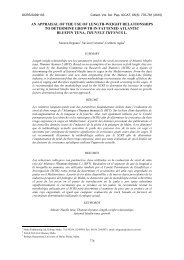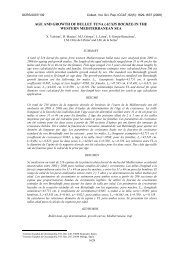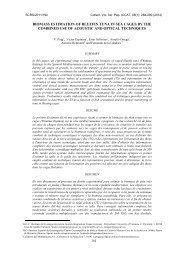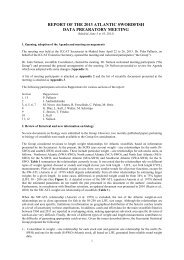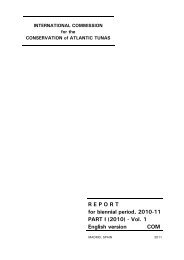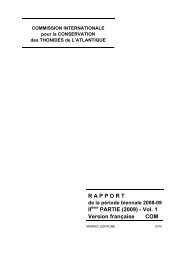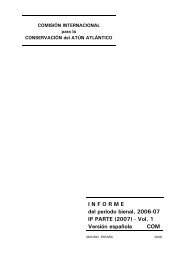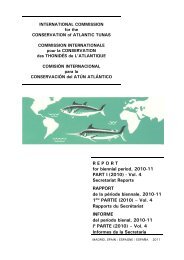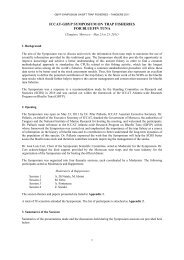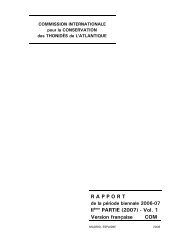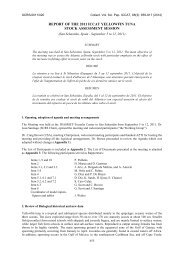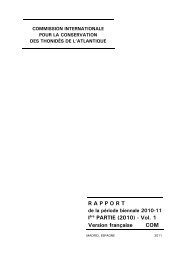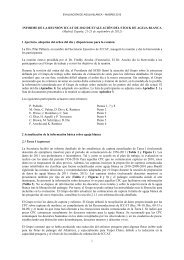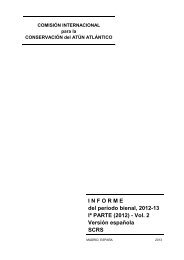E - Iccat
E - Iccat
E - Iccat
Create successful ePaper yourself
Turn your PDF publications into a flip-book with our unique Google optimized e-Paper software.
PWG REPORT<br />
Specifically, what would occur if a coastal State applicant had no catch history? The Delegate of the EC replied<br />
that the only time that this provision would apply would be if the applicant did have such a catch history. The<br />
Delegate of China also voiced his concern with the proposal being in the form of a recommendation, rather than<br />
a resolution, to which the EC responded that it believed that the measure needed to be binding.<br />
The Delegate from Canada approvingly noted that this would ensure a more transparent process. However, she<br />
noted that the wording in the text regarding the past behavior of the applicant was ambiguous and suggested a<br />
compromise that a specific time period, perhaps of ten years, might be used instead.<br />
The Delegate of the United States also supported the general idea of this proposal, but shared the concerns of<br />
Canada regarding the vagueness of some of the language. She questioned whether operative paragraph 5<br />
concerned the behavior of the applicant or of the actions by other RFMOs toward the applicant, which may be<br />
based on unsubstantiated allegations. The Delegate of the EC clarified that the provision in question concerned<br />
the behavior of the applicant, not other RFMOs. The Delegate from Japan helpfully suggested that good faith<br />
actions by the applicant in other RFMOs would be a positive factor in the Cooperating Party determination but<br />
that ICCAT should not be limited in considering only those actions taken by other RFMOs.<br />
The Observer of Chinese Taipei reported that Chinese Taipei cooperated with all other applicable RFMOs, with<br />
the exception of the IOTC, noting that this organization has never acted upon their repeated applications for<br />
Cooperating Party Status. He noted Chinese Taipei’s reservation on the idea of taking into consideration actions<br />
and information from other oceans or relative to non-ICCAT species when considering the Cooperating Status<br />
question.<br />
The Observer from Belize noted that it invites such comparison with its behavior in other RFMOs and<br />
emphatically agreed with the Delegates of Canada and the United States that there needed to be a statute of<br />
limitations on the question of past actions. He commented that activities in the Atlantic, however, should take<br />
priority in ICCAT´s deliberations. He stated that there should not be multiple standards within ICCAT, but that<br />
the same data provision and other requirements should apply equally for new applicants, continuing applicants,<br />
and current Cooperating non-Contracting Parties, Entities or Fishing Entities.<br />
The Delegate from Morocco commented that some of these provisions appeared discriminatory towards new<br />
applicants with either no catch history or no documented historical catch. The Delegate of the EC replied again<br />
that this requirement did not apply to applicants without a catch history, noting that despite these requirements,<br />
the case of each applicant is unique and that the Commission would still need to weigh these various<br />
considerations. He stressed that the lack of an historical fishery would not preclude a party from receiving<br />
Cooperating Status. The Delegate of Canada added that the IATTC addresses this catch data issue as a request,<br />
rather than as a strict requirement for Cooperating non-Contracting Party, Entity or Fishing Entity status.<br />
The Working Group also discussed whether the provisions contained in this proposal should apply to the current<br />
applicants for Cooperating Party status. The Delegate of the EC expressed the belief that ICCAT should suspend<br />
action on Cooperating Status issues this year so that applicants can be assured of having a clear understanding of<br />
their new responsibilities and the Commission can get all the necessary information to make an informed<br />
decision. There was no agreement on this point among the Parties.<br />
After a few revisions, the Recommendation by ICCAT on Criteria for Attaining the Status of Cooperating non-<br />
Contracting Party, Entity or Fishing Entity in ICCAT (see ANNEX 5 [Ref. 03-20]) was approved by the PWG<br />
and forwarded to the Commission for final adoption.<br />
5.2.2 Requests for consideration<br />
A representative from the Secretariat introduced the document “Update on Cooperating Party Requests”<br />
(Appendix 9 to ANNEX 10), which informed the Working Group on current Cooperating non-Contracting<br />
Parties, Entities and Fishing Entities and responses to letters sent to those Parties, Entities or Fishing Entities<br />
believed to be fishing in the ICCAT Convention area. Applications in 2003 were received from Belize, Cuba,<br />
Egypt, Guatemala, Guyana and Netherlands Antilles.<br />
With minimal debate, the PWG agreed that Cooperating Status for Chinese Taipei and the Philippines should be<br />
renewed. A statement by Chinese Taipei appears in Appendix 10 to ANNEX 10. The PWG also proposed to<br />
grant this status to Guyana. In making this decision, the PWG noted that Guyana chose to work with the<br />
Commission and seek Cooperating Status before considering development of fisheries for heavily exploited tuna<br />
243



